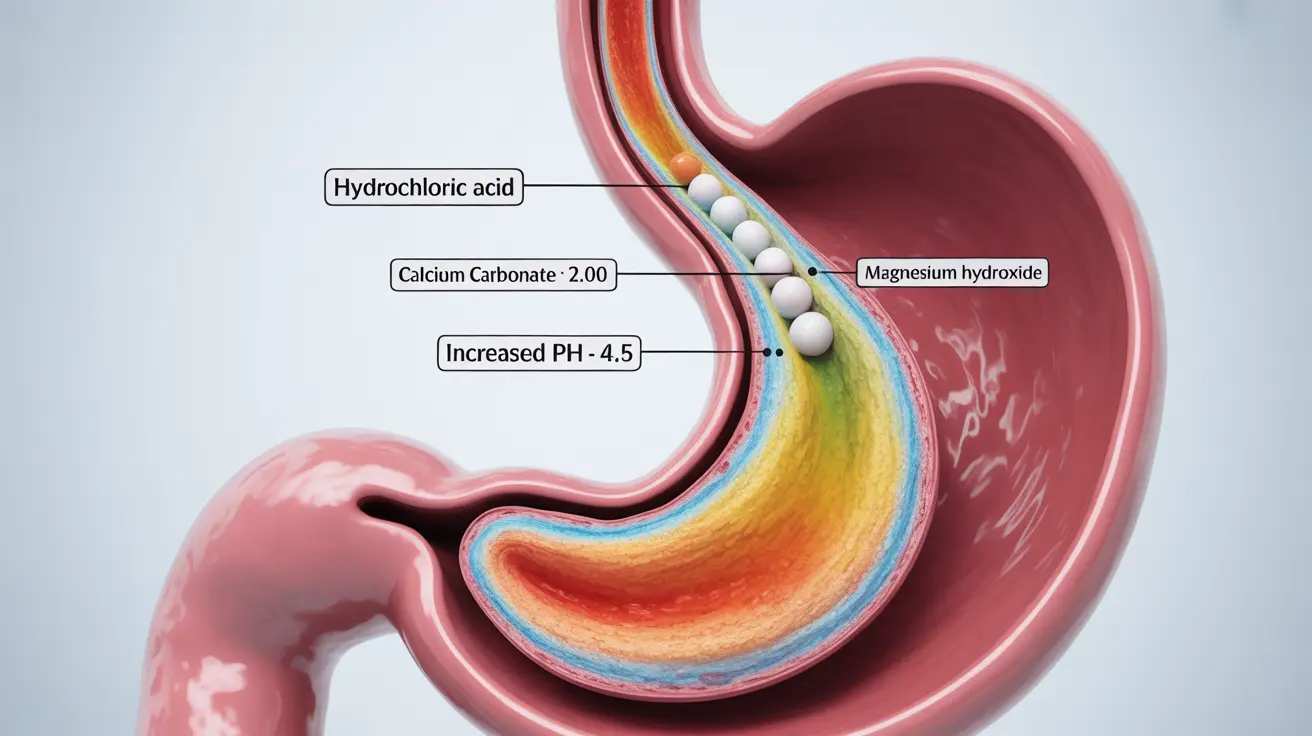For millions of Americans struggling with acid reflux, antacids provide quick relief from uncomfortable symptoms like heartburn and chest pain. These over-the-counter medications work by neutralizing stomach acid, offering a readily available solution for managing acid reflux symptoms. Understanding how antacids work and when to use them is crucial for effective symptom management.
In this comprehensive guide, we'll explore everything you need to know about using antacids for acid reflux, including their mechanism of action, potential side effects, and when to consider alternative treatments.
How Antacids Work
Antacids function through a straightforward chemical reaction in your digestive system. When you take an antacid, it neutralizes excess stomach acid by raising the pH level in your stomach. This chemical reaction helps reduce the burning sensation and discomfort associated with acid reflux.
- Calcium carbonate
- Magnesium hydroxide
- Aluminum hydroxide
- Sodium bicarbonate
Types of Antacids and Their Benefits
Different antacid formulations offer varying benefits and onset times for acid reflux relief:
Liquid Antacids
These typically work faster than tablets or chewables because they're already in solution form, allowing for quicker acid neutralization.
Chewable Tablets
These are convenient to carry and provide sustained relief, though they may take slightly longer to work than liquid forms.
Combination Products
Some antacids include additional ingredients like simethicone to help relieve gas and bloating along with acid reflux symptoms.
Safe Usage Guidelines
While antacids are generally safe for occasional use, it's important to follow these guidelines:
- Take antacids as directed on the package
- Wait at least 2 hours between taking antacids and other medications
- Don't exceed the maximum daily dosage
- Take antacids when symptoms occur or shortly after meals if predictable
Potential Side Effects and Precautions
Most people tolerate antacids well, but some may experience side effects such as:
- Constipation (more common with calcium-based antacids)
- Diarrhea (more common with magnesium-based antacids)
- Changes in bowel habits
- Calcium buildup with excessive use
When to Consider Alternative Treatments
If you find yourself relying on antacids frequently, it may be time to explore other treatment options or lifestyle changes. Regular use of antacids might mask underlying conditions that require different medical attention.
Frequently Asked Questions
How do antacids work to relieve acid reflux and heartburn symptoms?
Antacids work by neutralizing stomach acid through a chemical reaction that raises stomach pH levels. This helps reduce the burning sensation and discomfort associated with acid reflux and heartburn almost immediately after taking the medication.
What are the most common side effects of taking antacids for acid reflux?
The most common side effects include constipation (especially with calcium-based antacids), diarrhea (with magnesium-based products), changes in bowel movements, and potential mineral imbalances with long-term use. Most side effects are mild and resolve on their own.
Can antacids be used safely for long-term management of GERD?
While antacids are safe for occasional use, they're not recommended as a long-term solution for GERD management. Chronic use may mask underlying conditions and lead to potential complications. Consult with a healthcare provider for appropriate long-term GERD treatment options.
What are the differences between antacids and other acid reflux medications like H2 blockers or proton pump inhibitors?
Antacids provide immediate relief by neutralizing existing stomach acid but don't prevent acid production. H2 blockers and proton pump inhibitors work differently by reducing acid production and providing longer-lasting relief, though they take longer to start working.
When should I see a doctor if my acid reflux symptoms do not improve after using antacids?
Consult a doctor if you experience persistent symptoms despite antacid use, require antacids more than twice weekly, have difficulty swallowing, experience unexplained weight loss, or develop chest pain that might be unrelated to acid reflux. These could indicate a more serious condition requiring medical evaluation.




